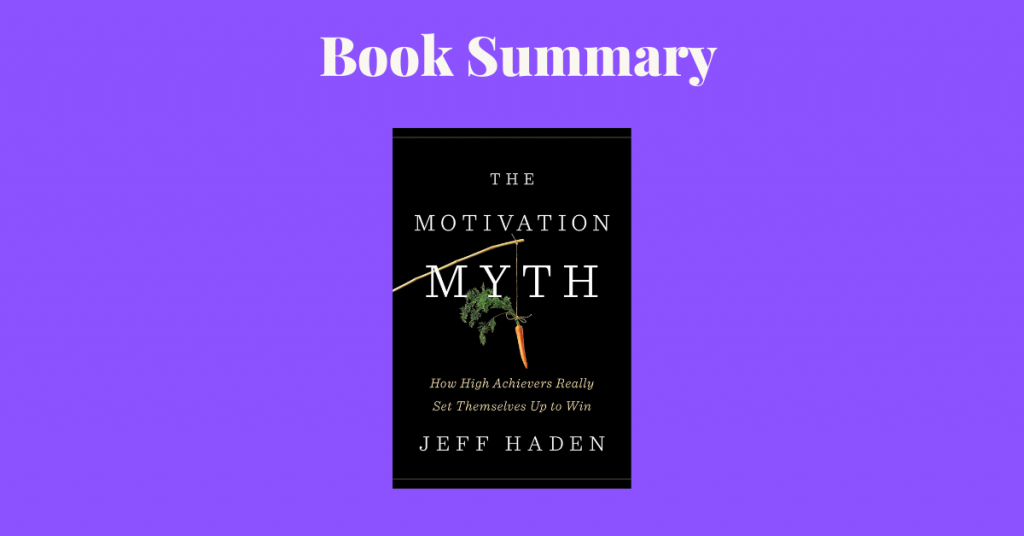The Motivation Myth by Jeff Haden helps us distinguish between myth and facts about motivation and helps us achieve great things such as the athletes, CEOs, or celebrities we look up to.
Book Title: The Motivation Myth: How High Achievers Really Set Themselves Up to Win
Author: Jeff Haden
Date of Reading: August- September 2018
Rating: 8/10
What Is Being Said In Detail:
The Motivation Myth has nine chapters:
- CHAPTER 1 Motivation Is Not the Spark
- CHAPTER 2 The Greater Your Focus, the Lower Your Chances of Success
- CHAPTER 3 Your Goal Must Always Choose Your Process
- CHAPTER 4 Happiness Comes to Serial Achievers
- CHAPTER 4.5 Wishing and Hoping Is the Most Unrealistic Approach of All
- CHAPTER 5 To Gain Incredible Willpower . . . Need Less Willpower
- CHAPTER 5.5 One Question Provides Nearly Every Answer
- CHAPTER 6 Why Work Smarter When You Can Work Your Number?
- CHAPTER 7 You Don’t Need a Coach; You Need a Pro
- CHAPTER 8 Do More by Doing Less
- CHAPTER 9 The Bottom Line
The first chapter is all about how successful people approach motivation (it’s a boring process).
The second chapter is about setting the goal and then forgetting about it to focus on the process.
The third chapter is about setting up processes that will help you reach your goals.
The fourth chapter is about taking 5-to-7 year-long increments to become successful at one thing (serial achiever).
The fifth chapter is all about eliminating as many choices as possible from your environment and doing the hardest thing first.
The sixth chapter is about doing a lot of reps because that will increase your odds of success.
The seventh chapter is about needing a pro: someone who will challenge you and expect you to take full responsibility for your own success.
The eighth chapter is all about learning how to say no.
The last chapter is about the bottom line and that boils down to one question— what’s your plan?
Most Important Keywords, Sentences, Quotes:
INTRODUCTION You Can Do—and Be—So Much More Than You Think
“We can all remember those times when we were hit with a lightning bolt of inspiration, whether to work out or to start learning French—and we can also remember how that urge never produced any action.”
“But motivation is really a result. Motivation is the fire that starts burning after you manually, painfully, coax it into existence, and it feeds on the satisfaction of seeing yourself make progress.”
“There is only one recipe for gaining motivation: success. Specifically, the dopamine hits we get when we observe ourselves making progress.”
“That’s why motivation isn’t something you have. Motivation is something you get, from yourself, automatically, from feeling good about achieving small successes.”
“When you consistently do the right things, success is predictable. Success is inevitable. You just can’t think about it too much. No obsessing allowed.”
“A slice of satisfaction, fulfillment, and happiness can be found in the achievement . . . but the real source of consistent, lasting happiness lies in the process.”
“Incredibly successful people set a goal and then focus all their attention on the process necessary to achieve that goal. They set a goal and then, surprisingly, they forget the goal.”
“Want to run a marathon? Forget some sixty-day shortcut system that promises maximum results from minimal input. Life doesn’t work that way.”
“Some people are successful. Some people are happy. You can be both. Here’s how.”
CHAPTER 1 Motivation Is Not the Spark
“Actually, motivation is a result. Motivation is the pride you take in work you have already done—which fuels your willingness to do even more.”
“Most definitions of “motivation” involve some phrase like “the force or influence that causes someone to do something.” Motivation is viewed as a spark, a precondition, a prerequisite, a pre something that is required before we can start. If we aren’t motivated, we can’t start. If we aren’t motivated, we can’t do. Bullshit.”
“You’ve probably put off a task, finally gotten started . . . and then, once you got started, thought, “I don’t know why I kept putting this off. It’s going really well. And it didn’t turn out to be nearly as hard as I imagined.” And here’s the thing: It never is.”
“Once you start, it’s easy to keep going. The act of getting out of the house to go for a jog is often harder than actually running the five miles you planned. The act of sitting down at your desk to start writing a proposal is often harder than putting together twenty pages of material. The act of picking up your phone is often harder than cold-calling twenty prospects.”
“Speeches don’t provide lasting motivation. Progress provides lasting motivation. Posters don’t provide lasting motivation. Success provides lasting motivation.”
“And where does the drive required to help you prepare come from? Success—small, frequent, repeat successes. It truly is a virtuous cycle.”
“Confidence is a feeling, but ultimately confidence is the result of knowing that you’re not only willing to do the work, but that you actually will do the work. You won’t try to hack your way to success.”
“Declaring what we want to be and how we will get there causes us to feel we are further along the path of becoming who we want to be—even though we have in reality done nothing but talk.*”
“Sure, some people may be more self-disciplined than you. But it’s unlikely they were born with some certain special something inside them—instead, they’ve found ways to make decisions that don’t require willpower and determination”
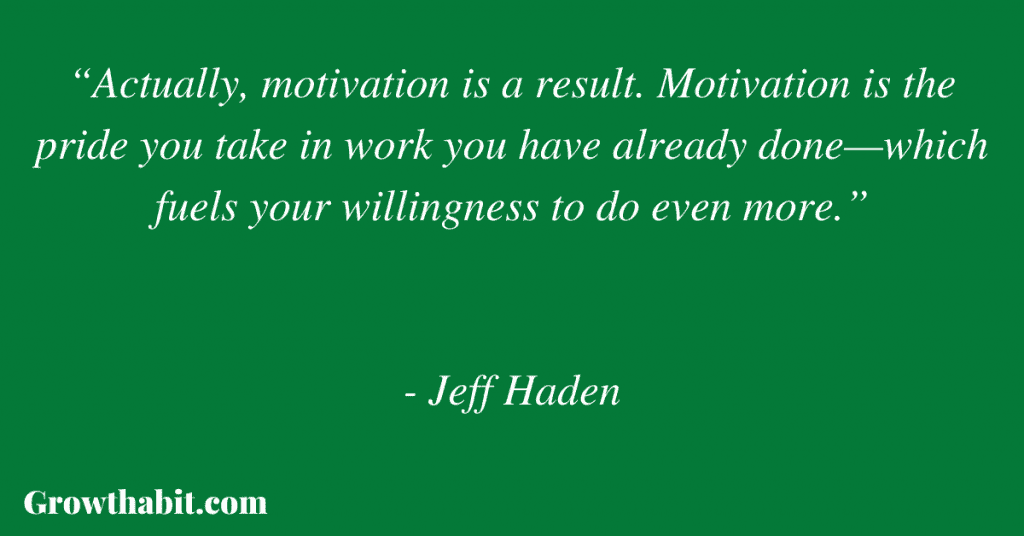
”All it really takes is a desire to keep on doing it. Finding a passion comes from sticking with it, and that is easy when you work hard to keep getting better. And before long, you realize you’ve gotten passionate about the passion.”
“You don’t just start a business; you’re an entrepreneur. You don’t just write; you’re an author. You don’t just strive for success; you’re successful.”
“Earned success is the best motivational tool of all. That feeling, that knowledge, is hugely energizing because it’s based not on wishing and hoping and dreaming but on a reality—a reality you created.”
CHAPTER 2 The Greater Your Focus, the Lower Your Chances of Success
“Choices are a problem, because choices force you to decide what you want to do.”
“What happens when you turn “I want to” into “I have to”? You make it to work on time. Punctuality is nonnegotiable. Getting to work on time is not a goal; it’s a task. So is making dinner; you have no choice. So is taking care of your kids; it’s nonnegotiable.”
“That’s why the power of routine, something we’ll look at in detail later, is so important. When you create a routine, embrace that routine, and see the results of that routine, you stop negotiating with yourself. You see your routine as a task, in the best possible way: Your routine isn’t something you choose to do; it’s just what you do. And you stop making choices that don’t support your goals.”
“ A dream, once born, quickly dies without a process to support it.”
“Everyone has goals. The people who actually achieve their goals create routines. They build systems. They consistently take the steps that, in time, will ensure they reach their ultimate goal. They don’t wish. They don’t hope. They just do what their plan says, consistently and without fail. They Forget the goal and focus solely on the process.”
“Dream big. Set a huge goal. Commit to your huge goal. Create a process that ensures you can reach your goal. Then forget about your huge goal and work your process instead.”
“If you dedicate yourself to working your process, you will make progress. Success is inevitable. And one day you’ll wake up and realize you can run five miles . . . and then ten . . . and then twenty . . . because each day you compared yourself with what you needed to achieve that day instead of with what you needed to achieve someday. Follow your process and someday you will run that marathon. You will have gone from here to there—almost without thinking about there. And somehow, almost magically, you will have stayed motivated and enthusiastic. How did that happen?”
“The first month I did just over 35,000 page views. (Ugh—but I kept my head down and stuck with the process.) The next month I did nearly 100,000. (Cool.) The next month I did over 300,000. (Very cool.) The next month I did nearly 900,000 page views. (Very, very cool.) The fifth month one of my posts was the most shared post on LinkedIn . . . and that month I did 2.1 million page views. (And for the last couple of years I’ve averaged over 1.5 million views a month.)”
CHAPTER 3 Your Goal Must Always Choose Your Process
“Let’s say you want to write a book. Create a plan to write a thousand words a day, stick to that plan . . . and seventy to eighty days later (depending on how long-winded you are) you will achieve your goal.”
“You get to choose your goal—but after that, what you want to do is irrelevant. What matters is what you need to do to achieve your goal. You can’t have dessert with every meal and lose weight.”
“So don’t start unless you’re truly willing to pay the price.”
“Setting a clear and specific target for each day’s effort automatically supports feedback: Either you did what you planned to do (great!) or you didn’t (boo!).”
“But don’t make changes to your process because you’re tired or lazy or bored—make changes because those changes increase your likelihood of ultimate success.”
“Remember, decisions are behavioral change killers, so eliminate as many decisions as possible.”
“The only way to become financially rich is to start your own business, even if it’s just on the side. Even if it’s just, at first, a slightly stepped-up hobby. Any other approach will not make you rich.”
“Or say you want to amass tens of millions of dollars in wealth. If you aren’t willing to work to create something new and different, if you aren’t trying to do something Zuckerbergian, your goal isn’t the problem. Your approach is the problem. If you aren’t willing to find a new way to fill an ongoing and nearly universal need, if you aren’t willing to do something Netflixian, your goal isn’t the problem. Your approach is the problem.”
CHAPTER 4 Happiness Comes to Serial Achievers
“We’re more likely to become “superior” in that career pursuit, not world class, not top 0.01 percent, but definitely more skilled than 95 percent of the population.”
“Take me. (Not because this is all about me but because I’m the only person I know a lot about.) I’m a ghostwriter and author. I’m a speaker. I’m a productivity-improvement consultant. Until recently I was a wedding photographer. And I take on physical challenges from time to time.”
“So no matter what their initial impression of me as a speaker, no matter how big the event, no matter how sophisticated the audience, they no longer see me as a successful speaker simply because I don’t speak on a full-time basis. In short, I must not be good enough to specialize.”
“To most people, professional “specialization” indicates accomplishment and success, when in fact the opposite is true. You, me, all of us—we’re too good to specialize. Venus is too good to specialize. She is capable of more than tennis. She’s too good to be just one thing.”
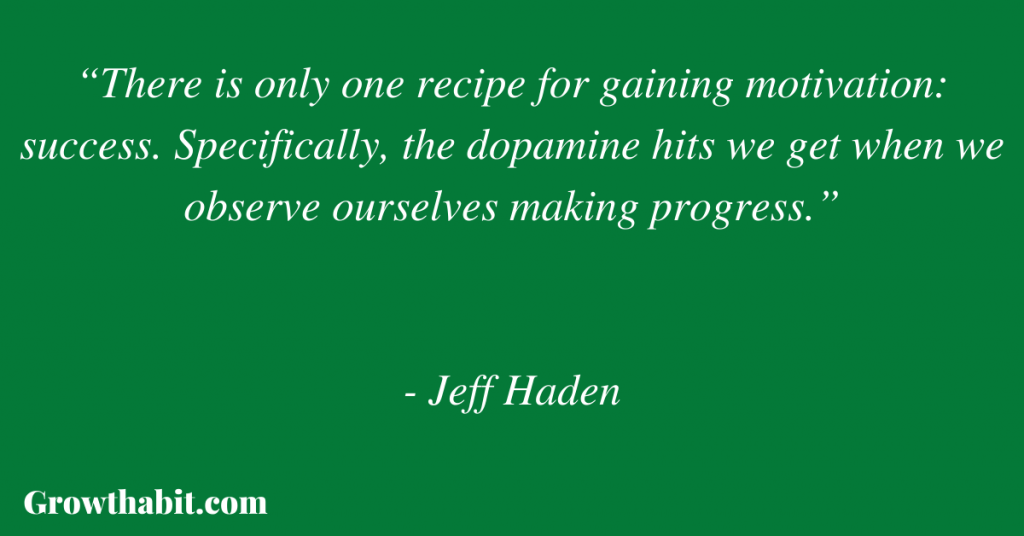
“personal goals are important not just to set but to achieve. Achieving personal goals, no matter how silly, how frivolous, or how impractical, is rewarding. And as you pursue those goals you meet new people, make new connections, build new friendships, and, best of all, feel better about yourself. Those are all things we can use more of in life.”
“But don’t automatically say that your family and friends are the most important thing in your life. If they are, that’s great, but if they’re not, and yet you’re spending the bulk of your time and focus on those relationships, then you’re only cheating yourself out of the chance to be happier by focusing on what is more important to you.”
“And that’s why this logical leap isn’t a leap at all: If you currently aren’t healthy, don’t feel good about your primary relationships (or the people with whom you are in those relationships don’t feel good about you), and aren’t making enough money, then you have no business taking on any goal that does not make one of those areas of your life better. It’s impossible to feel fulfilled and happy if you aren’t taking care of your basic needs.”
“If you aren’t bringing in enough money to keep food on the table and a roof over your head, you’ll feel guilty and selfish if you spend time training to climb Mount Kilimanjaro.”
CHAPTER 4.5 Wishing and Hoping Is the Most Unrealistic Approach of All
“Instead of acting, though, I let “idea” stay a noun. I didn’t make “idea” a verb. Fitness and computers and home health care weren’t really ideas, because ideas without action aren’t ideas. They’re regrets.”
“If your goal is to become extremely wealthy, get started on your entrepreneurial journey. That’s not a sure path to wealth, but it is the most realistic.”
“Then look at what is required to achieve that goal. What you need to do may not be what you want to do, and that’s okay. Let everyone else take an unrealistic approach and then wonder why they aren’t achieving more.”
CHAPTER 5 To Gain Incredible Willpower . . . Need Less Willpower
“Interruptions are productivity killers, so letting people know you’re doing something special and will be out of reach for a day is an absolute must. At a minimum, tell coworkers and family, but don’t forget to tell important clients or other people who normally expect you to respond to them. Send an e-mail a couple days before your EPD. Explain that you will be tied up on that day and you’ll respond to their calls, emails, etc. first thing the following morning.”
“Don’t just set a deadline. Totally commit to hitting that deadline. And feel free to play any mental games that help. Make a bet with someone else, or make a bet with yourself (where “losing” means you have to do something you really don’t want to do). In short, make the stakes personal. Find a way to be invested in the outcome not just professionally but personally.”
“Don’t just take it from me. Take it from Ray Care, whose twelve-year navy career included ten years as a SEAL. (SEALs are the kings of pushing beyond the possible. Basic Underwater Demolition/SEAL training includes the aptly named Hell Week, a grueling five-and-a-half-day stretch when each SEAL candidate sleeps a total of only about hours, runs more than two hundred miles, and does physical training for more than twenty hours each day.)”
“The key is to create structure and discipline for your week. Otherwise you’ll let things happen to you instead of making things happen. Otherwise you’ll let “urgent” push aside what is truly important.”
“Every family has peak times when its members can best interact. If you don’t proactively free up that time, you will often slip back into work mode. Either be working or be home with your family. Don’t just “be there.” Be with your family.”
“Everyone says they go the extra mile. Almost no one actually goes there, though. And when someone does actually go there,they usually think, “Wait. No one else is here. Why am I doing this?” And they leave, never to return. That’s why the extra mile is such a lonely place.”
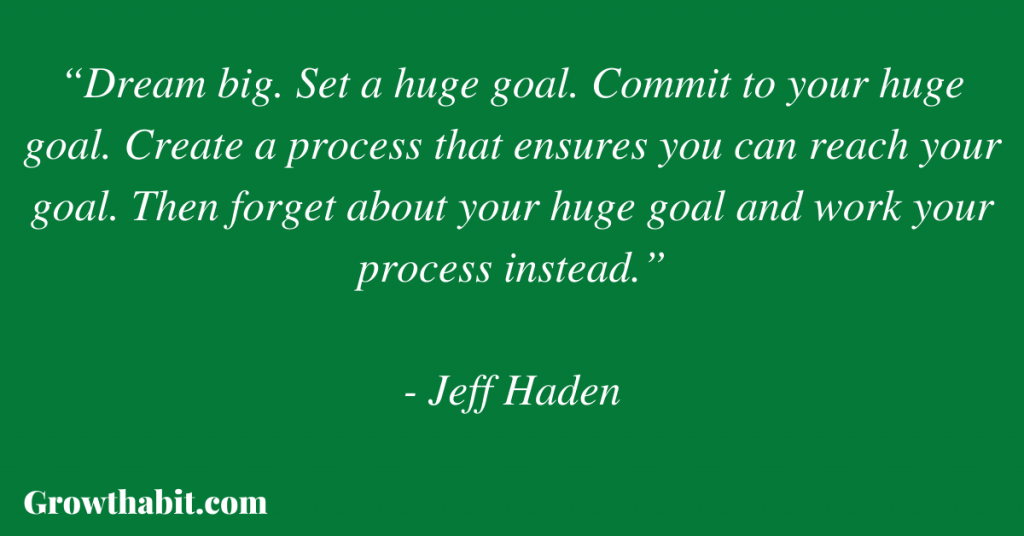
“More often, willpower is a function of success. It’s easy to stay the course when you feel good about what you’re accomplishing. Willpower is also a muscle that can be developed; the more you exercise it, the stronger it gets.”
“That’s why the more choices we need to make during the day, the harder each one is on our brain—and the more we start to look for shortcuts. (If you like, call this the “Oh, screw it” syndrome.) Then we get impulsive. Then we get reckless. Then we make decisions we know we shouldn’t make . . . but it’s like we just can’t seem to help ourselves.”
“Consistently doing what you need to do to succeed, with total focus and resolve, is incredibly difficult. That’s why the ability to work hard and respond positively to failure and adversity is so crucial. Resolve, willpower, and determination help successful people work hard and stick to their long-term goals.”
“There’s a quote often credited to Saint Ignatius of Loyola (and you have to love a fighting saint): “Pray as if God will take care of all; act as if all is up to you.”
“Adaptability is the ability to recognize the construct and working mechanisms of a system, figure out how it works, adapt to it, and then adapt it to your needs and goals.”
CHAPTER 5.5 One Question Provides Nearly Every Answer
“That’s how Herb Kelleher, the CEO of Southwest Airlines, makes so many decisions every day. Kelleher applies a simple framework to every issue: “Will this help Southwest be the lowest-cost provider?” If so, the answer is yes. If not, the answer is no.”
“apply the same framework to the decisions they make. “Will this help me reach my goal? If not, I won’t do it.”
“That’s why the most successful people seem so decisive. Indecision is born of a lack of purpose: When you know what you truly want, most of your decisions can—and should —be almost automatic.”
CHAPTER 6 Why Work Smarter When You Can Work Your Number?
“But when you think probabilistically, you begin to see success as the game it really is. Success is the result of rolling the dice a certain number of times. The more shots you take, the more chances you have of hitting the target. Working your number helps you predict how much failure you can expect on the road to success.”
”I was under the impression that talent would lead to opportunity, but really, networking led to opportunity. Networking came first—then I had to show that I could do it. I’ve always told my wife that for the longest time it was who I knew and not what I knew.”
”Success is based on people first and strategy second. Build a great team and you will accomplish things beyond your wildest dreams. You grow from the reflected glory of your people.”
”I have never seen a great leader that didn’t have the generosity gene. Take care of your people, let them know where they stand, cheer them, never take credit for what they do, and they’ll go to the moon for you.”
“Most people don’t mind a boss who is strict, demanding, and quick to offer (not-always positive) feedback . . . as long as he or she also treats every employee fairly. (The best bosses treat each employee differently while treating every employee fairly. There’s a big difference between sameness and fairness.) Consistency and fairness are based on communication. The more employees understand why a decision was made, the less likely they are to assume unfair treatment or favoritism.”
CHAPTER 7 You Don’t Need a Coach; You Need a Pro
“Do what the pros do: Find a person who challenges you. Find a person who lays out a process so seemingly daunting, so seemingly insurmountable, a course wherein the there seems insurmountable but so does the here . . . and who helps you achieve something you never dreamed you could.”
“Your pro can get you to where you want to go because he won’t coddle you or tell you what you want to hear; he’ll tell you what you need to hear and need to do.”
“That’s because your pro will often simply lay out what other highly successful people did to achieve that level of success—people you will never meet. For example, Stephen King writes two thousand words a day and, as he says in his book On Writing: A Memoir of the Craft, “only under dire circumstances” will he allow himself to shut down before he gets his two thousand words. (Yep, the Kingster works his number.) If you want to be a writer, you could do a lot worse than simply doing what that pro does.”
“The blueprint is there. If you’re into fitness, workout plans abound. If you’re into business, biographies abound. If you want to learn a particular skill, the blueprints are there.Just be willing to follow them. Don’t think you can somehow “hack” your way to the same level of success. You aren’t that smart. I’m not that smart. Maybe Tim Ferriss is that smart, but there’s only one Tim Ferriss. Ask him. He’ll tell you. (Just playing, Tim.) So no, you don’t need to know the pro you emulate.”
“Coaches think about making the process fun and uplifting. Pros show you how to succeed—and expect you to take full responsibility for your own success.”
“Stop comparing yourself with yourself. Stop comparing yourself with the people around you. Go see a superstar in action. Whether it’s a speaker, a musician, a performer, an athlete, or an entrepreneur, find a way to expose yourself to exceptional skill, exceptional expertise, and exceptional talent.”
“Decide what is important to you and then structure your life—and your process—to ensure you accomplish the things that really matter.”
“Feeling successful is internal, not external.”
CHAPTER 8 Do More by Doing Less
“We all dream of being great . . . but we can’t all be great at everything. But we can be the best we can be at the things we choose to do. That’s how every successful person starts out. They don’t know they’ll be superstars. They don’t know they’ll be world-class. They just know they want to be as good as they can be.”
”Will Doing This Benefit Me in Some Way?”
“Say you’re asked to speak at an event. That may be a cool opportunity, but what if the only benefit to you involves your ego? If you have nothing better to do, go for it . . . but shouldn’t you use that time to do more of what you do best?”
”Is This More Important Than What I’m Currently Doing?”
“You already have non negotiable goals: meeting your basic financial needs, meeting your basic health needs, taking care of your family . . . If the “opportunity” negatively impacts those things, boom: automatic “no.”
“Often the biggest savings when you cut an expense don’t involve the actual cost; the biggest savings lie in the time involved in doing or maintaining or consuming whatever the expense represents. Pick one expense you can eliminate that will also free up time and effort. And you’ll get to do more of what you do best.”
“Drop One Personal Commitment”
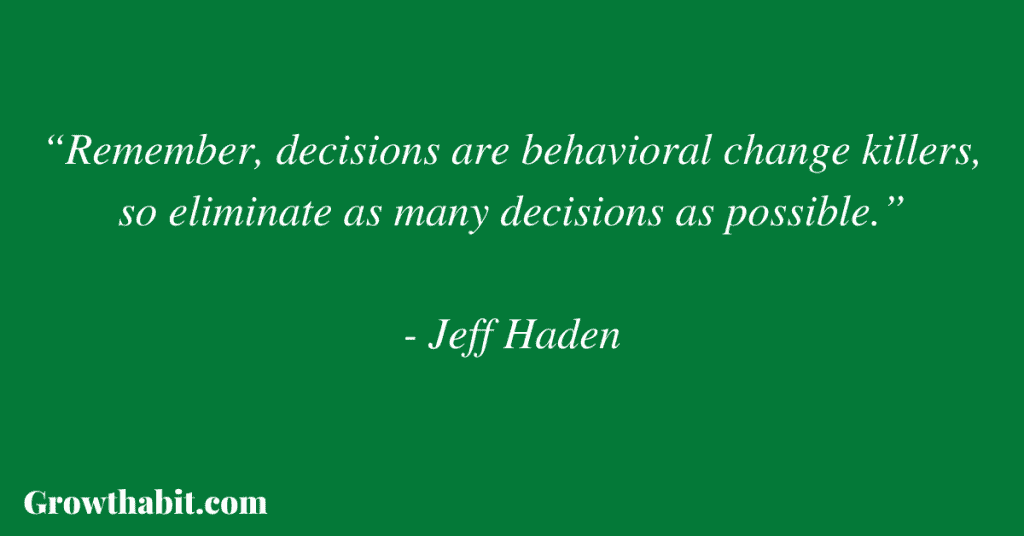
“Think about one thing you do out of habit, or because you think you’re supposed to, or simply because you don’t know how to get out of it—and then find a way to get out of it. The momentary pain—or in some cases confrontation—of stepping down, dropping out, or letting go will be soon be replaced by a huge sense of relief. Then use that time to do something with real meaning.”
“Yes, I did. But it bears repeating, your relationship is one of the biggest drivers of happiness (or lack thereof). For all you results-oriented individuals—your relationship is also often one of the biggest drivers of professional success: People with relatively prudent and reliable partners tend to perform better at work, earn more promotions, make more money, and feel more satisfied with their jobs. So there.”
CHAPTER 9 The Bottom Line
“The bottom line is what The Motivation Myth is all about: getting past the fluff and puff and fire walks and achieving the goals you want to achieve. Like most bottom lines, this one is clean and simple. Don’t tell me your goals. Don’t tell me your dreams. Tell me your plan.”
“Everyone starts at the bottom. Everyone starts out insecure and hesitant and uncertain. The only difference between incredibly successful people and the rest of us? They found a way to put aside their uncertainties . . . and try.”
“Your dreams are important, but your plan is what will allow you to achieve your goals and live out your dreams. Don’t wait for motivation. Get started. Work your plan. When you do, you’ll find all the motivation you need.”
“The way to avoid this phenomenon and harness the support or peer pressure of friends is to talk about the routine you plan to follow, not your goal. Say, “I plan to run three miles on Monday, Wednesday, and Friday.” That works.”
Book Review (Personal Opinion):
The Motivation Myth by Jeff Haden is one of those books that doesn’t state the obvious things, but flips a field on its head. And the book did this thing when it comes to motivation. It dispels the myths and gives you clear, practical, and actionable steps that you can apply to your life to “get more motivation.”
Rating: 8/10
This Book Is For (Recommend):
- A starting entrepreneur who is struggling during the grind phase of their startup
- A young person who wants to lose weight or run a half-marathon
- Anyone who has quit their goals because of lack of motivation
If You Want To Learn More
Here’s Jeff talking on a podcast about the book:
The Creative Penn
How I’ve Implemented The Ideas From The Book
There were quite a lot of things I took from the book, but the biggest one was to set goals, define processes to get there, and then forget about the goal itself. I did the same thing with my reading and writing habit and today, I’m building a business out of those habits!
One Small Actionable Step You Can Do
Eliminate one choice from your every day and make it a routine.

